Fatawa
The following are the verdits of some of the highest ranking and most widely respected Shia scholars on the issue of blood mourning rituals such as Tatbir and Zanjeer:
Grand Ayatullah Khoei
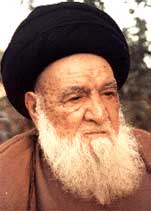
“If blood matam and hitting oneself with chains, which are practiced in Muharram, cause serious harm, or harm or ridicule the religion and sect then it is impermissible.”
Al-Masa’il al-Shar’iyah, istifta’at Imam Khoei, al-Ibadat and al-Tariq al-Najah, v.2, p.445
Question:
During the days of Muharram particularly on Ashurah, the Shiah people hurt their backs with “Qameh” or chain, which is a bunch of small chains. Each chain is about 16 to 18 cm long. Each chain has a sharp small knife fixed in it. These people take off their shirts, and start hitting this “Qameh” on their back continuously for sometime, whilst saying, “Ya Hussain”. As a result their body bleeds very badly. Even their slacks or shalwars become wet with blood.
Regarding this action we have some questions as follows:
(a) What is the order of the shariah about hitting (with) such “Qameh” or chains? Please explain in detail.
Answer:
Bisimihi Taala. This action has not been mentioned anywhere in the Holy Shariah. Not only that, but in any case it causes damage and becomes a source of mockery for the others, it is haraam.
(b) Some people later on go and offer the prayer in the same clothes soaked with their blood. If someone raises any objection, they answer that this blood which has been shed in the name of Hazrat Imam Hussain (a) thorough the chain or qameh is not najis (ritually impure). Therefore there is no problem in reciting the prayer with this blood. It is humbly requested to your honour to explain the order of the shariah in extensive detail on this matter.
Answer:
Bismihi Taaala. As far as the taharat (purity) is concerned, this type of blood is not exempted, but it is just like the other blood of human beings in general and it does not make any difference.
Stamped: 18th Jumādā al-Ūlā 1409 AH. Ayatullah Khoei.
Click here to see the scanned image of the fatwa with the seal of the Ayatullah
Question:
“Hitting (one’s self) with chains and tatbir are from the rituals that we witness during the month of (Muharram). What is the ruling in the case of this action being harmful to the self along with bringing criticisms of others (towards the sect)?”
Answer:
“It is impermissible if it necessitates considerable harm, or entails degradation and humiliation.”
Source: Sirat al-Najat, v. 2, Q 1404
Grand Ayatullah Sistani
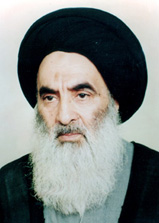
Question:
I want to know the status of beating our backs with knives (Zanjeer) on the day of Ashura? What is it’s status in our Fiqh?
Answer:
The philosophy of mourning during ‘Ashura’, is to respect the symbols of religion and remember the suffering of Imam Hussain, his companions, and his uprising to defend Islam and prevent the destruction of the religion by the Bani Umayyad dynasty. These rites must be done in such a way that in addition to serving that purpose, it draws the attention of others to these lofty goals. So those actions which are not understandable and cause misunderstandings and contempt for the religion must be avoided.
Click here to see a stamped fatwa with a similar reply.
The following question was sent to the liaison office of Ayatullah Sistani in London (najaf.org):
Question:
“Please tell me if cutting yourself in muharram for Imam Husayn (a) is haraam or not.”
Answer:
“Reviving Hussaini traditions is Mustahab but one is not allowed to Harm the body or the noble reputation of the Faith.”
The obligation of following the Hakim in issues such as this one. The Hakim in our era is Ayatullah Khamenei:
Question:
“Are the ahkam wila’iya (orders of the juristic authority) of the Wali Faqih implemented upon all the Muslims globally or is it specific to the area of his authority?”
Answer:
“The Hukm of the Mujtahid who fulfilled the criteria and is accepted by the general masses, is implemented without any bounds in what is related to ordaining society unless his mistake becomes apparent and was contrary to what is certainly proven from the Qur’an and Sunnah.” Fatwa number 134
“It is not permissible to abrogate/break the hukm (order/command/rule) of the (religious) governor/ruler (hakim), who meets all the necessary criterion (for governance/ruling), even by another mujtahid, except if it (the hukm) is contrary to what has been proven, with certainty, by the Qur’an and Sunnah.”
Minhaj al-Saleheen V. 1 page 15
Grand Ayatullah Abul Hassan Esfahani

Ayatullah Esfahani (1860–1946) was the highest ranking Shia jurist and the sole Marja of his time. He openly supported the stance of Ayatullah Muhsin Al-Amin on this issue.
“The usage of swords, chains, drums, horns and the likes today, which have become common in mourning ceremonies on Ashura, is definitely forbidden and against religious doctrine.”
Dayrah al-Ma”arif Tashayu’, v.2, p.531; A’yan al-Shia, v.10, p.378; Professor Hassan Shabir, Tarikh Iraq Mu’asir, v.2, p.340
Grand Ayatullah Muhsin Al-Amin Al-Amuli
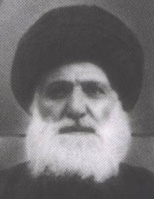
Ayatullah Muhsin Al-Amin (~1868-1952), was one of the greatest scholars of his time. He is known for his biographical encyclopaedia, Ayan Al-Shi’ah (62 volumes) and for his very strong opposition to blood shedding rituals. He is known to have boycotted meetings where they were performed.
He wrote the book “Al-Majalis Al-Saniya” (1928) in which he said: “And what some people do injuring themselves with swords and hitting themselves in a way that harms them is from the encouragement of Shaytan”.
In 1927 he wrote “Rissalat Al-Tanzih” specifically to prove the prohibition of blood rituals and he declared them to be innovations (bid’ah). In it he wrote: “It is from the saddening things… using drums and flutes, and cutting the heads in a way that show the Shia in a barbaric way and make the others mock them… and on top of that (they) consider it a kind of worship and attribute it to the purified Ahlubayt (a).”
During his era, Ayatullah Muhsin Al-Amin’s position against blood flagellation was supported by a number of other scholars including: Ayatullah Abul Hassan Esfahani, Sayyid Muhammad Mahdi Al-Qazwini, Abd al-Karim Al-Jazairi, Shaikh Ali Al-Qummi, Shaikh Jafar Al-Budairi & Sheikh Mahdi Al-Hajjar.
Grand Ayatullah Khomeini
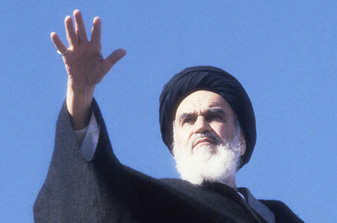
Ayatullah Khomeini was known for his very strong attachment to the remembrance of the tragedy of Karbala. He used the struggle of Imam Hussain (a) to inspire the Shia of Iran to revolt against the oppressive Shah (the Iranian uprisings began on Ashura). He would always remind people to involve themselves in mourning for Imam Hussain (a) and asked them to put a great deal of emphasis on the more natural mourning ceremonies. However he was not in favour of blood flagellation and other misguided practices.
His responses when asked about hitting oneself with blades:
“You want to do something for God, but in situations where your actions might harm Islam, refraining is best. Instead participate in chest beating processions endeavour to hold these events with greater glory.”
“In the current situation they are to refrain from blade beating. Passion plays are permitted as long as they do not include the forbidden practices and do not bring disrepute to religion. Reciting of the tragedies of the “master of the unjustly treated” (Imam Hussain (a)) is the noblest and most recommended (of actions) on this occasion.”
“Mourning and chest beating for the “unjustly treated” (the victims of the tragedy of Karbala) is amongst the best of religious practices, but the participants must exert due diligence to avoid wounds and the flowing of blood. If such actions bring about disrepute to the religion then they are forbidden. At any rate it is reccomended that the participants refrain from such actions.”
Click here to see these rulings with the official stamp.
“In his name, the Most High. Do not perform blood matam or the likes in the present state. If it does not include forbidden actions or defamation of the religion than there is no problem. Although, reciting poetry is better and mourning the Sayyid of the Oppressed is of the best forms of worship.”
Istifta’at Imam, v.3, miscellaneous questions, question 37.
“I should speak here about the gatherings and memorial ceremonies that are held in the name of Imam Hussain Ibn Ali (a), neither us nor (other) religious persons say that everything done by anybody is correct and good. Many times some of the grand scholars considered these things deviated and bad and they forbade them. We all know that in the last 20 years and so the respected scholar Hajj Sheikh Abdul Kareem Al-Haeri Al-Yazdi (q), who was among the eminent Shia scholars, forbade the Shia from acting out the events and persons of Ashura, and he replaced them with a gathering for mourning and elegies, and this is what the other scholars do with the actions that contradict with the religious rules and they still forbid it until now.”
“Nahdat Ashura”, page 110-111.
“You should know that in order to preserve your progress then you should preserve these rituals, and of course if there are deviated and wrong actions done by some people who are not informed, then these actions should be stopped. But the mourning ceremonies and the processions should remain strong.”
“Nahdat Ashura”, page page 112.
Ayatullah Mutahhari
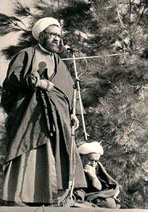
“Blood matam in its present form does not have a rational or religious basis. It is a clear instance of deviation. At least, in the present day it causes Shi’ism to be questioned. Activities that do not have any relation to the goals of Imam Husayn (a) are razors, blades and locks. Striking the head with a blade is the same. This is a mistake. Some people take blades and strike their heads making blood flow – for what? This action is not mourning.”
Howzah va Ruhaniyat, v.3
In his book “Al Malahama Al-Husainiya”, Ayatullah Mutahhari adopts Ayatullah Muhsin Al-Amin’s opnion.
Grand Ayatullah Muhammad Baqir Al-Sadr
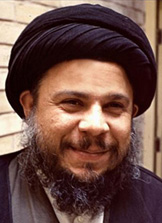
Ayatullah Al-Sadr speaking about the commemoration of the tragedy of Karbala:
“the commemoration is a thorn in the eyes of the tyrants, and these rituals have implanted in the hearts of the generations the love of Imam Hussain(a.s.) and the love of Islam, therefore we should preserve them although some of them need polish and modification.”
“Al-Shaheed Al-Sadr”, Shaykh Muhammad Rida Al-Numani (a very close student of the sayyid), Published Qom.
Grand Ayatullah Khamenei

Ayatullah Khamenei, in his position as the Hakim Al-Shari’i has given a Hukm forbidding blood flagellation. A hukm is binding on all Muslims, unlike a fatwa.
Question 1450:
Is hitting oneself with swords halal if it is done in secret? Or is your fatwa in this regard universal?
Answer:
In addition to the fact that it is not held in the common view as manifestations of mourning and grief and it has no precedent at the lifetime of the Imams (a.s.) and even after that and we have not received any tradition quoted from the Infallibles (a.s.) about any support for this act, be it privately or publicly, this practice would, at the present time, give others a bad image of our school of thought. Therefore, there is no way that it can be considered permissible.
Question 1449:
In commemorating the martyrdom of Imam Husayn (a.s.) on the tenth of Muharram, some people hit themselves with a machete, or walk bare-footed on fire. Such actions defame Shi‘ism and put it in a bad light, if not undermine it. They cause bodily and spiritual harms on these doing it as well. What is your opinion in this matter?
Answer:
Any practice that causes bodily harm, or leads to defaming the faith, is haram. Accordingly, the believers have to steer clear of it. There is no doubt that many of these practices besmirch the image of Ahlul Bayt’s (a.s.) School of Thought which is the worst damage and loss.
Question 1451:
What is the shar‘i criterion in determining physical or psychological damage?
Answer:
The criterion is noticeable and considerable harm judged by common sense.
Practical Laws of Islam.
“Blood matam is a part of the culture that was made up. It is an issue that has no relation to religion and, without doubt, Allah is not happy with it.”
“It is an incorrect action which some people perform – taking a blade in one’s hand and hitting themselves on the head with it spilling their blood. What do they do this for? How is this action considered mourning? Of course, hitting one’s head with their hands is a form of mourning. You have seen over and over again, a person who has had something bad happen to them, hit themselves on their head and chest. This is a normal sign of mourning. But, have you ever seen a person who has had something bad happen to their most loved (ones) hit themselves on the head with a sword until blood flows down? How is this action considered mourning?”
A speech given to scholars of Kahgiluyeh and Bavir Ahmad, Muharram, 1372
Grand Ayatullah Muhammad Hussain Kashif Al-Ghita
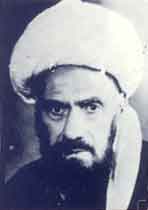
Ayatullah Muhammad Hussain Kashif Al-Ghita (d. 1954) was one of the greatest scholars of his time.
“If we want to act in accordance to jurisprudential principles and the derivation of religious rulings regarding the issue of mourning by hitting the face and other practices like blood matam (which are prevalent in the modern age) we will not find anything except forbiddance. We will not have any choice in issuing a verdict stating that these actions are forbidden. The reason is that there have been no exceptions to the principles of the forbiddance of causing harm to ones body or endangering the life of a human in this regard. Therefore, there is no reason for these actions to have any other ruling than forbiddance. But, most of the people who perform such actions do so more to show themselves off or to be fanatic; they do not perform such actions with pure intentions. This, in itself, is problematic; rather it is also forbidden because of some reasons involved with the age and the location as well.”
Al-Firdus al-Ala’, p.19-22
Grand Ayatullah Lankarani
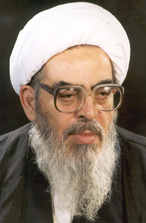
Q4: I have a question about blood matam or what is known as Qama zani or Tatbir? What is your ruling about using blades, knives, swords and spilling blood during mourning rituals? Is it permissible?
A4: It is necessary to act during Muharram rituals in such manner that it attracts others to the Imam Husain and his holy objective. So it is advisable to narrate the history of Ashura, cry, beat the chest and hold lamentation ceremonies, so it will cause Islam to be disseminated and the memory of those devotions to be revived. But to wound oneself with a poniard or a knife or sword which has no rational basis and justification for Islam’s foes will play a negative role; therefore, it is necessary for the Shiites believing in Imam Hussein’s school to avoid it.
Q&A section at the bottom of the home page.
“Keeping in mind the interest that has been seen throughout the world about Islam and Shiaism after the victory of the Islamic revolution in Iran, and keeping in mind that Islamic Iran has been considered throughout the world as the ‘mother of the Islamic world,’ and keeping in mind that the actions of the Iranian nation are taken as a role model for Islam, it is necessary, while mourning for the Master of the Martyrs, Abi Abdullah al-Husayn (as), to act in such a way that more interest and a stronger love in that personality and his holy mission will occur. It is clear that in this situation blood matam does not play this role; rather it has a negative effect because it cannot be accepted and has no form of proof to be understood by its opponents. Therefore, it is necessary for the Shia’s who love Imam Husayn’s (as) school of thought to refrain from it. If one had an oath in this regard, the oath would not have the conditions of a correct oath.”
Jama’ al-Masa’il, issue 2173.
“Moreover, the use of cutting tools for lamentation is not considered a customary means/method for mourning.”
Email answer [#838505], Date: Wed, 24 Nov 2004
Grand Ayatullah Makarem Shirazi
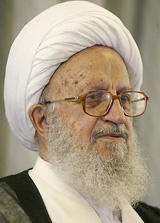
“The mourning congregations have to do their best to hold this ceremony as magnificent as possible, they should not permit anyone to do some acts which vilify the religion and give pretext to the enemies using the name of mourning congregation, acts like using music instruments, striking heads by sword, etc. although some people do these acts due to their passion toward imam Husain (a), but they should express this passion in a way that is acceptable and admitted by Imam Mahdi (a).”
source
Grand Ayatullah Jawad Tabrizi
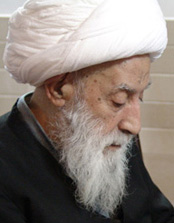
“Mourning the five people of the cloak is of the most important signs of religion and the secret to the survival of the Shia. But, it is necessary for our dear mourners to refrain from actions which defame the religion and are misused by the enemies of Islam.”
Istafta’at, question 2003, 2012, 2014
Question:
“Hitting (one’s self) with chains and tatbir are from the signs/rituals that we witness during the month of (Muharram). What is the ruling in the case of this action being harmful to the self along with bringing criticisms of others (towards the sect)?”
Answer:
“The inclusion of the aforementioned (acts) under the category of recommended grief for what occurred to the Master of Martyrs is problematic/doubtful.”
Source: Sirat al-Najat, v. 2, Q 1404
Grand Ayatullah Basheer Hussain Al-Najafi
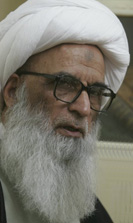
Question:
“Is it permissable to do qama and zanjeer zani hitting yourself with sword and knives?”
Answer:
“Bismahe Subhana
It is permitted unless Mawla Imam Hussain’s (as) and the Ahl-ul-Bayt’s persecution are considered as propaganda or if he is not allowed by his doctor because it might result in death or losing of a body part. Matam-qama or matam-zanjeer should not be done if he is settled in a part of the world where people due to their ignorance or lack of knowledge about Imam Hussain (as) after watching such matam are turned away from Imam Hussain (as). Therefore it should be avoided in front of such people.
Allah Knows Better.”
Source.
Grand Ayatullah Muhammad Ibrahim Jannaati
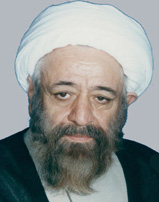
“One of the practices that is against religious rules in some of the mourning ceremonies is Qameh-Zani (drawing blood through cutting one’s scalp with a machete), a practice which is against reason and against the manner practiced by the imams. This practice in no way can be considered among the authentic religious rituals.”
“Imam Khomeini and the Culture of Ashura”, 1995, page 66.
“Refrain from performing these actions which are inappropriate, cause harm to the religion, and are imbalanced and superstitious. They have no jurisprudential foundations and cause the face of Islam and Shiaism to become damaged.”
Grand Ayatullah Kadhim Al-Haeri
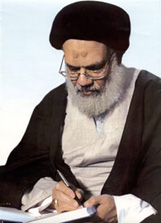
“We have witnessed that blood matam and the likes have caused the face of Islam and Shiaism to be destroyed. The disbelieving enemy in our time uses such actions to attack us; to introduce our religion as a superstitious, barbaric religion.”
“Secondly, regardless whether or not we have the same view of blood matam, it is necessary to obey the commands of the Wali al-Faqih, Ayatollah Khamenei, in this regard. The reason behind this is that he has taken a clear stance in this regard and has not left any room for disobedience. It is obligatory on all Muslims to obey his commands; those who agree with his verdict or perform taqlid to him and those who do not agree with him on this verdict or perform taqlid to someone else. In any case, it is obligatory on all Muslims to follow him because he is the Wali al-Faqih.”
https://www.alhaeri.co/
Grand Ayatullah Mazaheri
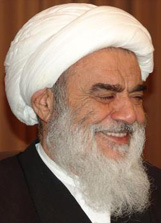
Question:
“What jurisprudential ruling does blood matam have?”
Answer:
“Everyone must refrain from this action because the Wali al-Faqih forbids it – even if they follow someone who permits it.”
www.almazaheri.ir
Grand Ayatullah Moslem Malakouti
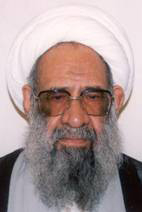
“The mourning sessions of the Master of the Martyrs, the grandson of the Noble Prophet (s) must be conducted in a method suitable to the Imam (a). It should not cause harm or weaken Islam or the Shia sect; rather, like his movement, it should cause the survival of Islam and Muslims; it should be a source of pride for them being free from all forms of innovation and superstition.”
Grand Ayatullah Noori Hamedani
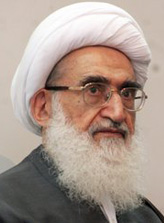
“The school of thought of the Master of the Martyrs, Abi Abdullah al-Husayn (as) is a school of enjoining the good and forbidding the evil, a school of raising Islamic merits. The history of Ashura which moves people has been the source of energy for all movements against oppression. The reason behind this is it ‘boils the blood’ of the lovers of this school of thought, especially in the present condition where the enemy has been slapped by Islam and its illegitimate benefits have been taken away. Therefore, it is necessary for the mourning sessions to be conducted in a beautiful way; that is a way that is in congruence with Islamic logic. Respected mourners must, instead of hitting their heads with a blade, think about hitting the enemy’s head who is occupying and weakening them, who is usurping their benefits and putting their Islam in danger on a daily basis.”
Istifta’at, v.2, p.597
Ayatullah Salehi Mazandarani
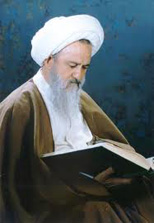
“There are no rational or lexical proofs, nor are there any principles, that can support blood matam in the mourning sessions of the leader of the martyrs, Imam Husayn (a), being permissible, let alone recommended. Furthermore, the principles and secondary rulings testify to its forbiddance. Therefore it is necessary to refrain from it.”
Ayatullah Jawadi Amuli
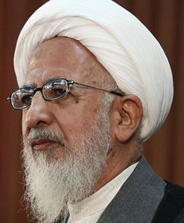
“Something that causes defamation to the religion and destroys the respect of the mourners is impermissible. It is expected for people to refrain from blood matam and the likes.”
Ayatullah Ibrahim Amini
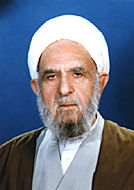
“Taking into account that the above issue has not been established religiously and it causes defamation to the Shia school in the present age it is necessary for the mourners of Imam Husayn (as) to refrain from it. Mourning for the Leader of the Martyrs, Aba Abdullah al-Husayn (as) is a form of worship that gets one close to Allah, the glorified, and the infallible Imams (as). Therefore, in this issue there is emphasis; moreover, it is obligatory for the lovers of the Ahl al-Bayt to refrain from performing the above mentioned action. The reason behind this is, firstly this action is not considered an act of mourning in the common view and it is only recommended if it is considered that. Secondly, in the present age, this action is considered superstitious and causes defamation to the Shia school.”
“Thirdly, Ayatollah Khamenei strongly forbids such actions and it is necessary for all Muslims and followers of the Wali al-Faqih to obey him and disobeying him is forbidden. Therefore, it is expected from all Shias in mourning sessions to refrain from these actions. (May) Allah, make us amongst the true followers of Imam Hussayn (a).”
Ayatullah Ali Meshkini
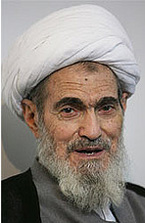
“Mourning for that holy personality is a political action; therefore, it must not be mixed with actions that would lessen its political effect, that would be considered superstitious, or that would defame Islam. Even if the person performing blood matam does not have the intention of harming Islam it is still an innovation and forbidden.”
“After accepting what was mentioned, it is problematic according to religious sources; some have even considered it forbidden in and of itself. Muslims must refrain from bringing this into mourning sessions for Hussain (as), which is a form of worship.”
Ayatullah Muhammad Wa’id Zadeh Khurasani
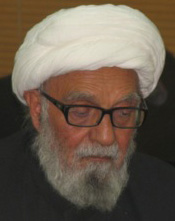
“One of the duties of ulama is to stop the intrusion of innovations and deviations in the domain of religion. Among the obvious deviations is the practice of qameh-zani (striking one’s head with a dagger) in mourning ceremonies for Imam Husayn (A) and qufl-zani (placing a padlock on their bodies) both historic and as a forthright way of confronting of an Imam with the intention of fulfilment of a prayer and removing it on its fulfilment) witnessed during the commemoration of Imam Husayn’s (A) martyrdom. The Shi’ah ulama, well meaning people and reformers have been distressed about this obvious innovation (bid’at).”
“Imam Khomeini and the Culture of Ashura”, 1995, page 140.
Ayatullah Ali Rasti Kashani
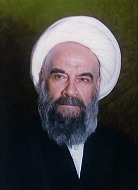
“Mourning for Abi Abdullah al-Husayn, the Master of the Martyrs (a), is of the best methods of seeking proximity to Allah and renewing one’s life and Islam. It is upon the Muslims to hold these ceremonies in a grand fashion and to refrain from committing any action which harms Islam or helps the enemies of Islam.”
“It is obligatory on all Muslims to refrain from such actions and to follow the leadership which will make the enemies of Islam loose hope in harming Islam.”
Shaykh Muhammad Al-Tijani Al-Samawi
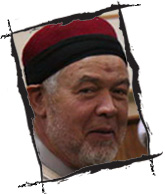
Shaykh Al-Tijani is the famous author of the book “Then I was Guided”, in which he describes his conversion from Sunni Islam to Shia Islam.
“As for self-flagellation, it is not one of the doctrines of the Shi`as, nor is it a part of their creed. Rather, it is what some commoners do, and Shi`as are not the only ones who practice it. There are some Sunnis, particularly those who follow the [sufi] Aysawi tareeqa, which is well known throughout all of north Africa, who practice rituals more damaging to Islam’s image than what some Shi`as do. Yet by practicing them they do not express their grief for the tragedy that befell Imam al-Husayn, nor for the suffering of Ahl al-Bayt, peace be upon them.
We agree with the author’s statement in his book in this regard, and we would like to work with him to remove this phenomenon from all Muslim lands. There are many sincere Shi`a scholars who prohibit such an abomination and try hard to put an end to it, as al-Musawi himself admits.”
Source
Ayatullah Hassan Tehrani
“In the present conditions, the issue that was mentioned causes harm to the Shia sect and is impermissible. Also, obeying the hukm of the Wali al-Faqih in this matter is necessary.”
Ayatullah Muhammad Abtahi
“One must refrain from committing actions that cause harm to the religion and it is obligatory to obey the commands of the Wali al-Faqih.”
Ayatullah Ustadi
“In accordance with what the Wali al-Faqih said, it is necessary for those who want to hold mourning sessions for Abi Abdullah al-Hussayn (a) to use methods which glorify divine symbols and to refrain from using actions which, in his words, cause harm to the religion. With hope that everyone fall’s under the leader of the martyr’s (a) grace.”
Ayatollah Ahmadi Miyanji
“An action which causes harm to the religion is impermissible. In addition, after the hukm by the supreme leader, there is no more room for questions; it is obligatory to obey his order.”
“An action with causes harm to the religion is impermissible.”
Ayatullah Muhammadi Gilani
“Whatever causes harm to Islam is definitely forbidden, especially when the Wali al-Faqih also forbids it. It obligatory for all to obey the command.”
Ayatullah Mahmoud Shahroudi
Speaking about how mourning activities must be performed:
“In his name, the Most High… But, there are three conditions that must be followed in regards to how they are performed:
2. That which does not cause harm to the religion and the Shia sect, or the Islamic society, or the Islamic republic. The reason is that if harm is caused to any one of these it would be of the greatest sin. Specifying this matter is in the hands of the Wali al-Faqih. This means that if the Wali al-Faqih specifies this matter in special circumstances in that an action is against the good nature of the Islamic society or causes harm to the religion of the Islamic republic and because of this forbids that action – it would be obligatory for all to obey him. In this case no mukhallaf can act in accordance to his own opinion.”
Ayatullah Abbas Mafuzi
“One must refrain from that which causes harm to the religion and obeying the Wali al-Faqih is necessary.”
Ayatullah Shar’i
“The Wali al-Faqih, Ayatollah Khamenei, considers the Ashura movement to be one of the strongest weapons for Shiism. It has been established in history and traditions have been narrated by the infallibles (a) which state that mourning the Master of the Martyrs is of the best forms of worship. There has been strong emphasis on it. He states that cultural Ashura movements must depict and strengthen the message of jihad and self-sacrifice in Islam and in this sect. Blood matam is an action that is not in congruence with the principle purposes of this movement. They cause harm to the Ashura movement. Therefore, it is obligatory on all Muslims to obey the orders and hukms of the Wali al-Faqih of the Islamic world. It is self-evident that taking this lightly and not obeying it will anger Allah.”
Ayatollah Muqtada’i
“By specifying the situation and announcing the hukm forbidding blood matam, for example that which was issued by the wali al-faqih, Ayatollah Khamenei, it becomes obligatory on all Muslims to obey this ruling; disobeying it is forbidden.”
Ayatullah Muhammad Yazdi
“It is necessary for everyone to obey the hukm of the Wali al-Faqih. Disobeying it is a sin and will have different punishments. Many of the mentioned items are clearly against the religion and are forbidden, and some of them cause harm to Islam. In addition to this, obeying the hukm of the Wali al-Faqih, Sayyid Ali Khamenei, is obligatory on all and disobeying it is a sin and will have different punishments. No other opinion can make it permissible to disobey the hukm of the Wali al-Faqih. The right of issuing hukms is limited to the Wali al-Faqih and a verdict (fatwa) does not overrule a hukm.”
Ayatullah Jafar Karimi
“With the jurisprudential opinion of the Wali al-Faqih, Ayatollah Khamenei, in mind, it is religiously forbidden and will be a cause of punishment to perform such actions which were alluded to claiming that they are forms of mourning and by disobeying the order of the Wali al-Faqih which is obligatory to follow.”
Ayatullah Muhsin Kharazi:
“In regards to what was mentioned, it is necessary and obligatory to obey the Wali al-Faqih and the Islamic leader.”
Ayatullah Muhammad Mumin
“Obeying the hukms of the Wali al-Faqih is obligatory.”
Ayatullah Muhsin Haram Pinahi
“It is obligatory to obey the hukms of the Wali al-Faqih.”
Ayatullah Ahmad Adhari Qumi
“Disobeying the Wali al-Faqih is a great sin and causes the holy Islamic government to be weakened. It is not obligatory to observe previous oaths; rather it is forbidden.”
Ayatullah Mussawi Tabrizi
“Mourning in the days of Muharram and Safar and keeping alive the holy mission of Hussayn bin Ali (a) is of the best forms of worship. Any action which causes harm to Islam and the holy mission of Aba Abdullah (a) is forbidden. Obeying the hukm of the wali al-faqih is obligatory.”
Mashallah. Very good effort. Good bless you
Bismihi Ta’ala
Salaamun Alaykum. Great information! MashAllah. Allah bless you.
bismihi ta’ala
may Allah accept your efforts; please keep up spreading the truth and let me know if i can be of assistance in any way.
Allahumma ‘ajjil li-waliyyikal faraj!
ALL these fatwas are from the Mazarani leadership and Imams of Iran.
Finally we can put this matter at rest and work on other issues 🙂
Truly an eye opener for people misguided by the middlemen or ‘affiliated clerics’ of certain Marajih, trying to sell innovations at the cost of deviating the Ummah and allowing it to be ridiculed by the people of other faiths.
Very nice brother, May God bless you and reward you.
Good points
hello there,
nice post here will came back
continue updating your blog
nice work really good to knopw what leaders say i used to do b lood matam but now refrain from it.As we are followers of ahlul bayt(s),we must try to propogate islam in best way!
However what abt other scholars who permit this act
In case of conflict in fatwas, fatwa of wali amr Imam Khamenei is valid only
Who said that wali-e-amr is Allama Sayyid Ali Khamenei? I have heard some famous Maraji from Najaf is wali-e-faqih. Who decided that it was none other than Allama Sayyid Ali Khamenei? Anyways, if it was decided, do we have any clear proof with Sayyid’s name on it? Or did Sayyid Ali Khamenei claimed himself to be Wali e Amr. Can someone share some proper content on it? As far as I knew, Wali-e-Amr is an Ilahi mansab and should come from Maasoomeen as. Does Majlis-e-Khobargaan includes Maasoom or any directions from Maasoom as?
May Allah Subhanahu wa Tala reward you for this detailed and analytical scholarly article.You have used the beautiful tools of Jurisprudence of Quran,Ahadis,Aql,Ijma and painstakingly collected all arguments and replies.reminds me of a saying of Imam jafar al sadiq a.s. to Mumin al Taq about his discussion with Zayd ibn Ali a.s.The Imam (a.s.) said, “You surrounded him from his fron, back, left,right, above and below and did not leave for any way out. Jazakallah
Salam Abrar wali amr or wali faqih has its boundaries its is valid only in iran and in those country who govt. Accepted him aa vali faqih. If you want confirm then confirm it directly not from mediator or maulana.
Salam.
Now after all this, even if someone practices this act, is a person who intends to harm Islam.
Therez only one thing now, accept it or declare urself a person who wishes to harm the mission of imaam Husain (a.s).
WE HAVE HAD A LOT OF ISSUES IN OUR CITY REGARDING THIS ISSUE. MAY ALLAH BUILD UP PEACE FROM THIS PLATFORM.
I work in a office with many Non-Muslims, they see this & say that “look you guys are real terrorists, you kill yourself & kill other innocents & therefore you people must be thrown out from India”
I feel very bad hearing this, I request my brothers especially ulemas to immediately STOP this.
Salam,
Just a light question if any one can answer to the context of the previous comment. Does that mean, if a non-Muslim praises the tatbir act, we should do more? Are you taking your deen from the comments of Non-Muslim? What if some non-Muslim says that Shias are the most courageous people, Shias never harm others because they take the pain on themselves instead of harming others. Definition of Jihad-al-akbar isnt that, that where individual is fighting with itself instead of others?
إن أصل هذا الخبر حسب تتبعي هو ما رواه الشيخ المفيد في كتاب الإرشاد ص 232 ، وعنه العلامة المجلسي في بحار الأنوار : 45 / 3 : وجاء فيه أن الإمام الحسين عليه السلام قال لزينب عليها السلام : ( لا تشقي علي جيبا ، ولا تخمشي علي وجها ، ولا تدعي علي بالويل والثبور إذا أنا هلكت )
In Bihar al-Anwar and Al-Irshad (Sheikh Al-Mufid) : 45 / 3: Imam Hussein peace be upon him said to Zaynab peace be upon her: “Do not tear off your clothes for me, do not abrase your face for me, do not say “Woe, I am doomed”, when I will die !”
In Bihar al-Anwar and Al-Irshad (Sheikh Al-Mufid) : 45 / 3: Imam Hussein peace be upon him said to Zaynab peace be upon her: “Do not tear off your clothes for me, do not abrase your face for me, do not say “Woe, I am doomed”, when I will die !”
إن أصل هذا الخبر حسب تتبعي هو ما رواه الشيخ المفيد في كتاب الإرشاد ص 232 ، وعنه العلامة المجلسي في بحار الأنوار : 45 / 3 : وجاء فيه أن الإمام الحسين عليه السلام قال لزينب عليها السلام : ( لا تشقي علي جيبا ، ولا تخمشي علي وجها ، ولا تدعي علي بالويل والثبور إذا أنا هلكت )
Very good work May Allah bless you by the grace of Ahlul-bait.Allah may give toofeq to all muslims to understand the real Mission of Imam Hussain a,s
Excellent work of compiling rulings from top notch Shia scholars! May Allah and Masumeen reward you all for these efforts. Unless we hold the banner of Marjaiyat as instructed by our Imam (atf) we cannot expect to see progress and happiness anytime soon.
MashAllah a great informatory article. There are flaws amongst us and we ourselves are responsible for the bad name of our among the other school of thoughts or religions.
We must all of us be united;hold and stand under the banner of marajiat to get rid of such flaws. May Allah grant success to Marajas and iltemaas-e-dua
Very nice brother, May God bless you and reward you.
Great information !!! May Allah give all of us pure faith and wisdom to understand the real mission of Imam Hussain (a.s.) and give us courage to act according to the real noble cause of Karbala (ameen)
A Shia is bound to follow the decree of the Marja whom he/she follows, May Allah Bless him/her.
Jazakallah, May Allah (SWT) guide the followers of Panjetan Paak (AS) to the right path.
Dear brother,
It’s really a very good effort to educate the people about truth and may Allah bless u for this struggle.
mashallah very good info about fatwas, good effort, pls contact me for any help regarding anything on shia islam.
regards
Salam,
If this is the case then why the shiite Muslim’s every majalis is not preached with the rightful information rather then practice of other rituals.
Sadiq Noyan
May Allah swt shower you with blessings for this article,
Indeed we have to get rid of this invented and harmful practises that some few ignorant people do
maa,sha,Allah.
May God bless you and reward you.
Masha Allah. May Allah give you best rewards for it.
Sheikh al-Yaqoobi has also ruled tatbir to be Haram; perhaps you should add him to the list.
Masha Allah… its a good effort indeed and was waited a lot for maay decades…
Ajrukum Alallah….!!!!
It is no doubt difficult for a lot of Shia brothers to accept these fatwas as the practices of Zanjeer/Qama zani etc have been practised widely and for generations and no Aalim has the courage to speak out against this from the pulpits.
Salaam,
If it’s difficult for some brothers to accept these fatawas does this mean they should go against these??? If their Marja-e-taqleed has a fatwa against qama/zanjir zani then this means they CANNOT perform this act and if they do they must know that there’s no point in doing taqleed as in taqleed of a marja’ you must accept the whole package, NO PICK N’ CHOOSE.
You have to educate your self more about the teachings of Islam when you say old practices are correct because they are being carried out since long…..then u must worship stone as this is one of the oldest practice.
You forgot that we are the followers are 12 imams…..so don’t look into what generations did…look into whether our Imams did it….any one did khooni matam?
Only Allah(SWT) can reward your hardwork!!!
LANAT ON THOSE AYATOLLAS ABOVE WHO ARE GOING AGAINST THE HIGHEST FORM OF WORSHIP!
Brother Ali Shah,
Can you show me with hadeeth from the Aimma(as) that this is the highest the form of worship. Please bring your sources.
Thank you,
Brother Ali Shah
Even I am doing zanjeer zani every year but u don’t have any rights to say bad words to our marjaahs. We can’t even compare them with us. They are naaeb e imam. And according to me zanjeer and qama matam is not wajib but it’s not haram also. Some people have misunderstood by saying that this act is wajib but it’s not.
If you are in taqleed of a Marja’ then you have to accept all his ahkaam. You canot pick n, choose. Plus hukm is hukm. If there’s a fatwa from Marj’a it is WAJIB on you to follow it. There’s no if’s and but’s.
Shame on u. It would have been better for you to keep your mouth shut. Just go and read farman of Imam A.S. about Ghali shias such as u,
we should not treat anyone with these words. If he does not agree, we should talk to him in a way he can understand. We are treating a patient with wrong medicine. If he does not believe in nizam e faqih and wilayat e faqih, we shoud use different path. We are responsible of preaching Islam in a way that is liked and practiced by Rasool and Imams. My brother Ali Shah would not have met any of the above Ayatullahs. and Maraja e karam. But tell me with honesty, what would have he thought about them if he had met with them. Ulama e Karaam never talk about all of this in there majalis. Even they say we will not talk on this topic in moharram. Most of them are paid workers or are selling the blood of Imam for few coins. If they had been doing there work, brother Ali Shah would not have been so harsh with them.. You would have seen children not behaving correctly with parents, yes they are at fault but not solely responsible for this behaviour. Parents are also to be blamed. I will request Brother Ali Shah to see some one more knowledgeable then him and show him all these fatawa and ask him why so many people against it and still we are doing it.
slm……..
brother you are alive nowadays just because of These Ayat ullah,s otherwise you will be treated as animals in this world.so try to be true shia and also not to be in ignorance
Astaghfirullah! Sending la’nat to highly educated and mataqqi individuals is lack of taqwa itself. As well as lack of knowledge.
Instead of sending la’nat to these noble marja’s you should back your argument with a proof.
You show even one hadith or anything you can find in history that tells that qama/zanjir zani was allowed by any of the Imams or Prophet(a.s.) Wasn’t Imam Zainul Abideen more near and hurt by the incident of Karbala?? Aren’t the rest of the 8 Imams closer to Imam Hussain? Did they do these acts or anyone during their times did these acts??? Who invented these???? People like you and I. Are we nauzubillah more close or more knowledgable than our Imams?????? Why argue on this??? There’s no evidence whatsoever to act upon these customs have no importance at all let alone over riding the Ulamas and Marja’s????????
jiyooo…maula salamat rakhe
i agree coz these pains and performances are not degrading islam this is showing what they the enemies of islam did to imama Hussain and his family Including the women.where was islam and disgrace od religiou0s practises then? if we do r doing this to answer them and shpowing the paind all this blood that is out wth zanjeer zani and kamaa is what they caused at that time and how they tortured our 4th imam and all the women especially syeda Zainab s.a. who was whipped etc etc. and how come the imams never stopped it? we had 8 imama after imama Hussain who never objected and told to stop? this is also showing the miracles of people who r doing r not suffering and they are walking around. also showing that how we want to suffer.that pain.
SO PLS STOP ALL THESE SO CALLED FATWAS WHICH IS HUMILIATING AND INSULTING SYEDA ZAINAD S.A.WHO DID ALL THIS WHEN SHE WENT FOR CHEHLUM IN KERBALA.RESPECT HER AND HER PAIN ETC .SHE COULD HAVE OBJECTED ALL THESE. ISLAMIC SCHOOL .SHE WAS THE FIRST TEACHER AND ZAKIRA OF AZADARI AND TEACHING OF GHAME HUSSAIN.SO ANY FATWAS THAT GO AGAINST HER TEACHING AND PRACTISES WHERE SHE HAS NEVER OBJECTED OR ORDERED TO DO INCLUDING ZANJEER AND KAMA .THEN THATS IT.ONE SHOULD THINK AND BE REALISTIC.THIS.THIS IS ABOUT AZADARI SYEDA ZAINAB S.A.AND MARTYR OF KERBALA .
ALL THE AYATULLAS HAVEN’T SUFFERED AND ALSO THEIR FAMILIES TOO.THAT IS Y THEY ARE EMOTIONLESS.STOPING TO DO ALL HIS
Pity on you that when you say its highest form of worship and no Imam did it, Only you came to know about it. Else, you could have brought till date one ahadith to prove that this or that Imam has done khooni matam to mourn their jadd.
You have sold your souls for wordly benefits. You are getting paid to tarnish the image of learned men (ulemas) and everyone who has aql know u very well.
ayatollah ka matlab ha allah ki nishani.or in sab ne deen ko parny me apni sari zindagi laga di ab kal ke batchy uth kar in par lanat karty han kah jo deen ke bary m kuch janty hi nahi theek tahan se quran parna nahi aata matlab samjna to darkinar.aik group is issue ko negitive sense me utha raha ha us ko khuda hidayat dy
Absolutely
Bar khamenie Lanath Beshumarr !!
Khooni matam pe fatwe lagane waloon pe Lanath!!
Blood matam is Wajib, Ojeb !
Ya Ali(j.j) Madad!!
AND ……zara zaban sambhal kay bat karo apni oqat dekho pehlay phr bat karo…..tum jesay jahil logon ki wajah say shia badnam ho gay hain. tumhain apnay rehbar ki izat nae kartay wo tu IMAM (A.S) kay naeb hain……tum kis tarhan keh saktay ho kay KHOONI MATAM wajib hai? tumharay pas koi dalil hai…….tum kis tarah kehtay ho kay tum shia ho? jab kay tum IMAM (A.S) kay NAEB ko GALIAN detay ho…..
Brother Ali Haq,
Can you bring the references from the Aimma(as) that show blood matam as wajib? Thank you in advance as it will help enlighten myself and other readers.
THERE IS NO REFERENCE THEN CAN U PLS SEND ME THE REFERENCE FROM IMAMS WHERE IT IS ALSO SAYING THAT THIS SHOULD BE STOPPED.
THIS IS NOT WAJIB IT IS MUSTAHAB AND THEN U SHOULD FIRST OBJECT BIB ZAINAB WHO DID A LOT OF THIS ON THE CHEHLUM WHEN SHE FIRST VISITED IMAM HUSSAIN, GET ALL THE REF FROM AIMAS WHERE THEY HAVE OBJECTED HER AND ASKED HER TO STOP THIS?
Can you bring the references from the Aimma as that shows wali faqih is important to us if you will not obey then you are not muslim? With references and its authenticity.
Watch your tongue, you vulgar person. You are not even the dust of the feet of these Maraje. What is ‘JJ’ after Imam Ali (A.S)’s name anyway ?
IS THIS WHAT UR MARJAH TEACH U TO TALK .U HAVE NO RIGHT TO TELL HOW THEY SHUD TALK COZ U R NOT ANY BETTER
Getting into argument with this jahil is useless. Such people are bent upon defacing our religion and are harrmful. May Allah S.W.T. guide him or help us to get rid of such persons.
WHAT RELIGION R U TALKING ABT LISTENING TO MARJAHS WHO R GOING AGAINST THE PRACTISES OF BIBI ZAINAB.
U SHUD READ HADIS OF 11 TH IMAM RATHER THEN LIVING ON MARJAHS FATWAS COZ.11THIMAM, HE HAS ALSO SAID B AWARE OF THOSE WHO WILL COME AMONGST US CLAIMING TO B US AND CONFUSE AND COZ LOT OF FRICTION AMONGST US. I CAN C THS AS U NEVER KNOW THE PEOPLE CALLING AYATOLLAHS, STOPPING THE ACTIONS AGAINST OUR BIBIS AZADARI AND HER WAY OF PREACHINH IN MOHRAM AND MAJALIS, COULD B ONE OF THEM .V DONT KNOW KNOW .THATS Y U GET UR FACTS RIGHT AND GET DIRECT KNOWLEDGE TOO.
Who the hell said Bibi Zainab sa practiced this rituals. Your misguided brother. And you are saying that no Imam as has said to stop this. This rituals have some 200-300 years of history. This rituals were not present during Imams as times. So How can they say about this.
Please read the books dont only listen jahil zakir who manipulate the riwayat. Read the waqia of janab e zainab s.a at the time on chehlum in karbala why she forced her self and fallen from camel its only to distract Hazrat Abid AS concentration. Please jahil read full waqia then you will know it was not matam.
ha ha ha! Jahil sala
Bismillah,
Those who say lanat are illiterate and ignorant people. Until today, there were unable to bring one ayat or one ahadith to prove that khooni matam is compulsory act to mourn for the shohda e karbala. The reason for their continuous rebellion is that most of them are paid agents who get funds to tarnish the image of ulema because the enemies of Islam has found that whatever they plan and plot against Islam, these ulemas are not allowing the ummah to get gumrah by educating them about Quran and the teachings of Imams.
So, wherever you find these kinda people who try to tarnish the image of ulemas, remember that they are doing their job for a worldly reward by selling their souls.
Excellent work, I highly recommended and share this website to all and learn from this devious act.
Also another scholar you can add to the list is the late Sayyed Fadlallah (ra).
Q: What is the ruling regarding Tatbeer (self-flagellation)?
A: Tatbeer is forbidden, due to the harm it might cause to one’s or the other’s body and the humiliation and disgrace it might cause to the sect of Ahl El-Beit (a.s.); thus, it is impermissible to encourage this act.
RUBBISH ONLY JAHILS WILL DO THIS
Salaam,
Very good effort. However, brothers/sisters behind this page, please work harder in regards to referencing ALL quotes!
Jazakomollah Khair
jaza’k allah
jaza’k allah
Asalam Alikum …Great work done…may all bless and cherish you with his blessing…
Mashallah wonderful work.
May Allah (swt) reward you for your effort
WHAT WONDERFUL WORK ABOUT CALLING SOMEONE JAHIL AND SHUTING THEM UP?R U ANY BETTER THEN THEM ACCORDING TO ISLAM? ALL THIOSE SUPPORTING SUCH COMMENTS R MORE JAHILS COZ THEY DO EVEN KNOW THE MEANING AND PRACTISES OF RELIGION AND IMAMA HUSSAIN. U COULD HAVE IGNORED OR SHUD HAVE HAD A STRONG ANSWERS FROM HADIS WHICH HE DID NOT HAVE.TO DEBATE..
IT IS ALL ON FACTS AND HADIS AND OF IMAMS THEN ALSO BLINDLY LISTENING TO ALL MOVIS AND AYATOLLLAS .
On sending the web-link http://www.tatbir.org, One Shia Brother replied to my email as under:
‘Tomorrow, other muslims / non muslims may object on our majalis / tear shedding / chest beating / use Turba for Namaz etc, should we stop doing this as well. Let us NOT create divisions with ourselves, at this point of time unity is more important in Shias to fight together wahabism’
My reply to him as under:
‘Unlike bloody rituals, shedding of tears, chest beating etc. are the natural way of expressing sorrow. Almost Every human being do so at some point in their life time. Anyone denying this fact will have to play music and dance in the funeral procession of their relatives or their loved ones.
Exercising cruelty on our kids and ourselves is no longer considered to be as a heroic deed and it is hard to digest in the modern civilized society. It can’t be a means to fight wahabism. By encouraging bloody rituals, we are damaging true and peace-loving image of our community and moreover, justifying the view points of wahabi’s in terms of matamdaari. Muslims and Non-Muslims of the world society is watching our action and they are compelled to think positive about wahabis and unfortunately they stand by with them resulting into increase in their population.
Agreed that “UNITY” is important but safeguarding “The DIGNITY” of our heroes/ ideals are much more important. We are followers of holy Ahlulbayt (A.S) and our action and deeds will reflect the teachings of our masters.
I vote for spreading the true message of Karbala in an appealing way where participants are not only a handful of ‘shia’ and ‘so called shia’ but also muslims and Non Muslims as a whole.’
God Bless you, please also add a section on tabarrah, based on the much circulated quote from Nahjul Balagha and Khamnai
ALSO SEND THE VERSES OF QUARAN WHERE TABARRAH IS ALSO NARRATED BY ALLAH IN MANY WAYS TO ALL SO ONE KNOWS WHOM HE HAS SENT IT TO IN DETAILS
By the way, is it possible to take material from your site (as it is and also translated perhaps) for wider dissemination? Thanks in advance 🙂
Salaamun alaykum,
Everyone is welcome to take material from here as long as the website is given credit.
VERY GOOD EFFORT TO FIND OUT FROM SO MANY ULAMAA. AND WE MUST OBEY THEM AS THEY ARE REPRESENTATIVES OF OUR IMAM E ZAMANA A.T.F.S.
THIS IS ALL MANKIND AS THIS IS ALSO MAKING U GUMRAH.DONT LIVE ON THEM.MANY SUCH ULALAMAS HEADS WIIL BE DESTROYED BY OUR 12 IMAM ZAMAN.ALSO TRY TO KNOW ALL THIS AS WELL AND KNOW R U FOLLOWING THE RIGHT ONE.
ALLAH BLESS YOU ALL
Jazakallah
May Allah s.w.t. behaqqe Ma’sumeen succeed this Campaign
Amin
The pious scorlars
The real scholars. Allah bless you all with us together
Elahee
HATSS OFF
good work no doubt.
Need more citations, like mentioned in comments. Ayatullah al Udhma Muhammad Hussain Fadhlullah is missing obviously.
people who are commenting against this fatwa should be provided a platform where they can meet a scholar and talk to them. Believe me no one who do qama or zanjeer think that zameer akhtar naqvi or people like him are scholars. They just listen to them to enjoy and time pass. Also people like zameer akhtar etc say zanjeer and qama is halal. so people again like to follow them. Although they know he is not a scholar, as such he is against the system of scholastic activities and institutions. So people need rationale for any answer. Those who can dance on the road with there sisters and brothers can not understand that zanjeer and qama is defaming Islam. They just do it. So better we try to uplift the level of knowledge of people and make they HAYADAAR and BAHAYAA. This is the first thing of Islam or any other religion on earth. There is a saying of prophets that if you have lost your Shame then do what ever you like.
People killed Imam Hussain because they had lost there shame. They were not shameful to face Prophet on the day of Judgement. so they killed Imam Hussain. We should make sure that media which is taking away the sharm o haya of our generation is taken care of. otherwise people will keep on dancing on the roads. even without cloths.
100% satisfied with great scholars..God bless all of our leaders……
Masha’Allah, this is excellent work. May Allah SWT give you more knowledge & energy to carry forward the TRUE message of Ahlul Bayt (AS).
JazakAllah Khair.
Fear Bibi (sa) Fear Imame Zamana (atfs) At least Fear Allah. What face you will show you misguided one.
Masha Allah… its a good effort
JazakAllah, May Allah reward you for your efforts.
Is this site updated in terms of fatawas or is it a completed?
Pls clarify. I’m doing my bit my share the the URL with as many momins as i can. Some are receptive while others are not and in return share videos and other clips which try hard to convince the viewer that it permissible.
One question which is being asked is When we visit Karbala on ashoor, tatbir is practiced there. While there are so many Ayatullah who are present and dont comment on this. If tatbir was not permissible then how come such as practise is allowed in the Harram of Imam Hussain (A.S)?
Kindly let us know the response that should be given to such statements
Excellent work.
Jazakallah
The above holymen are various shades of Jews and Majoosis
Here in Kashmir. Late Molvi Iftikhar Hussain Ansari took responsibilty over his shoulders and asked people to go for blood matam openly….
Kindly give a treatment for this..
And ask his son Molvi Imran Ansari current major shia leader here to abandon this practice…
Salamalikum, bro I tried to convey this message to lots of his followers , but they are giving weired excuses, they Pretend Molvi Iftikhar n Imran nauizbillah ahead of Rehbar. So if Imam a.s himself will try to convenience them they will still say that Ifthikhar Ansari is Right. Didn’t you saw how they mad out sect to bottom in Khandah Incidence???
Salam. Thanx.for detail information.
Mashallah, a great treasure has been released for people who perform these acts and yet claim that these acts are permissible in Islam.
Should be an eye opener for all momineen brothers. After all these facts, people are to decide what is wrong and right.
Jaza Kalla Khair
Mashallah truly an extra ordinary piece of work brothers. May Allah bless you. An important point. Non Shia criticise us for doing tatbir and generalise these actions towards Shia …One should reply by saying that religion should not be judged based on the actions of the commoners but rather the actions the fatwas and sahrai ahkam of our marijas and leadership. I think this website is a clear reflection as to what stance our marijas have on this issue. As for our Sunni brothers specifically the takfeeris …. One should ask there stance on suicide bombings and killing on innocent human beings?? The commoner will say it is impermissible but we find text in which there Ulemas there classical authors ex. Ibn Tayhimiya justify and encourage such heinous and barbaric acts one should ask lej Al queeda isis taliban haqqani network jandullah etc etc who are they???? Are they Shias???? No brothers they are Sunnis…….
Inas salat u tanha anil fahshai wal munkar
Dear Brother in Islam,
I must appreciate your efforts which you have put in order to compile the Fatwas of the scholars. It is an act that is indeed the need of time. May Allah help you in doing the right and pious work and help you in spreading the message and true essence of Karbala.
Jazakallah
I would request to all my friends to share this information on their fb page.
Shism is the best form in fact the real face of Islam. Do not let it be disgraced by some of our wisdom less acts. I myself used to do zanjeer madam but left it understanding the harm I m doing to community. Marajae Taqleed and concept of Wilayate Faqeeh are priceless assets of Shism. It is they that we can still see Islam in its real form
Wassalam
Good & Informatic Information
Jazakallah,
I have done Qam -e zaani after avoiding it for 2 years knowing the fatwa of rehbar e moazam but has done it behind the scene which will not defame Islam but I do realize it is somehow not allowed by shariah, I will avoid it from next time..May Allah(swt) give us taufeeq to spread the message of our Ahlebait(as) as they have said and let us not go beyond the teachings of Our Imams..Really feeling sad I did it but I was in high grief from shabe ashoor and couldn’t control but have realize now it will defame Islam so will avoid it Inshallah…Wslm..
Jazakallah… great effort..
mashallah,niceand great hard working on this serious issue,,,,,buton this issue hafiz bashir allow the permission of blood matam ,i read his view on his book ( share hussain a.s) all the views of mujtahid superb……….nice job,,,,,,the duty of layman should follow the order on his mujtahid……
mashallah,nice work,good job……
Very good!!!!!!!!
Excellent work!!! I shared URL to my contacts via whatsapp
These Ayatollahs are giving such insightful answer that would have been a no brainer to any average Westerner.
Please show the Fatwa of Ayatullah Al Uzma Shaik Muhammad Hussain Najafi (Lahore).And you have done this work very nicely MashaAllah.
jazakumAllah khair for such a compilation and may we all be guided to the true form of practicing our faiths and may we and our sec be away from all such bidaahs
Excellent work may ALLAH reward you for opening the eyes of blind people. we must always seek the help of these learned personalities rather than listening to less learned people, and follow them.once they issue a FARMAN just obey, NO if and BUT.
Excellent work may ALLAH reward you for opening the eyes of blind people. we must always seek the help of these learned personalities rather than listening to less learned people, and follow them.once they issue a FARMAN just obey, NO if and BUT.
Good efforts and collection
Salamalikum,
Mashallah may Allah bestow his choicest blessings upon you, this is a great piece of work done by you , Mashallah.
Jazak Allah…
I know thats a great effort but Just have one confusion, can i get the refference about these all sayings, or simply. How could i justify in front of anyone about its authenticity ?
Good stuff! I would like our scholars to share this information in majlis.
You forgot to mention Grand Ayatollah Muhammad Hussein Fadl-Allah in this list as well. Great job of listing so many scholars. God bless you.
MA! Very good work!! This deserved to be shared with others.
Jazakallah… May Allah give you more power to do more
True
great Ayatollahs
Jazakallah,..
I’m very Thankful for your this effort..
May Allah show them the right path those who are Barking and abusing at Ayatullahs. while they are nothing. not more than mud, Soil..
May we all adopt the right path. All mujtahideen saying are very right. our ignorant fellows are even not ready to listen such sayings of ulma e karam. They do SAB O SHITAM on our respected ulma in our majalis. A great work and guidance is required to our nation in this regards.Jazak Allah
Thank you!! It is 2015, this unnecessary practice must stop. If there is anything that any of us can do to help spread your message, please make it known on your page. Fi amanallah
It iz with out taqleed .It helps Islam to reach high levels.Don’t interfere in beliefs of people .It iz In hearts of Hussainies .U can not remove it.
Wah what a use of labels of mjtahideen
.
it is varily a great job by your side,that you have compiled all fatawas regardimg this issue.
Salaamo ‘alaikum wa rahmatullah. May Allah (swt) bless the individuals involved. This information is much needed as these innovations have become rampant and are overtaking the true message of the Ahlul Bayt. It’s astonishing that individuals without any proof nor logic from the canonical sources go against these scholars and instead follow their own desires. It’s a shame. Wa’salaam.
Thanks a lot for this great work…. From the very beginning these rituals were disturbing to me but I was forced to watch it… My friends at school would ask me why you Shia people do Azadari… I could defend everything because it made perfect sense but I had nothing to defend blood matam… I spoke about it to certain Ulema but they hushed me… thanks a lot for posting all this painstakingly collected information.
All I can say is Jazak’Allah.
This website looks like a gift to me just when I was trying to convince and collect fatawas of Mujtahideen.
Thank You so much for making this website and collecting all this information.
I am actually curious to know who created this website?
excellent information about the religion which i think so i’ve never heard before. but really surprising for me that after having such excellent version on these things by the scholars who are at height of knowledge then which thing is putting now a days’ Shias on deviation way.
In His name
MashaAllah great information. May Allah bless you for creating such a nice source of reference on the invalidity of Tatbir
I’m thankful to the person who had made this site. اجرکم من ربکم
Can you please highlight the link to “Home” and “Fatawas” below “TATBIR” on the top of the side in more significant colours?
Great effort.. An eye-opener for all shia muslims. May Allah give strength to follow our great Maraji and Wali e Faqih without asking questions against it. so that one day we will be able to follow our Imam Mahdi a.s. without questioning and just following Him
Slm.. i ask a Question For all Mujtahids can u tell me qama Zani is Mustahab or Haram ?? Bcz i want to know the answer of this quetion ?
Jazakallah great efforts
We must follow the guidelines given by our Maraje and should refrain from such act
Asalam alykum,, I am from India, Kashmir.. I was also doing Zanjeer zani, before some years now I skipped but here are thousands of people who still perform this, because some Great Religious scholors,like Aga Syed Baqir, Aga Syed Mohamad, Imran Raza Ansari, say that it is very necessary to perform Zanjeer zani/Qoma zani /blood matam,and they still don’t not believe that welayat Fiqi Syed Ali Khamnai has banned this, so please if anyone among you know the names of the books in which very old Grand Ayatollahs has banned thus please send me, authentic references in my email inbox my id is (saifaly100@gmail.com)and my Facebook Id is (saifali19@rediffmail.com)please please (saifali19@rediffmail.com)”””aplease,,),, Please pho
Firstly, All the praises to the One and only Almighty Allah (s.w.t.)!
Jazakallah, brother your compilation of the number of verdicts and findings of the Marja’s is really an eye opener for the deviant ones. The tatbeer in the form of blood shedding, face slappings and extreme chest beating is totally custom which is being carried on from generation to generation without finding or even caring about finding the islamic rationale behind it origin. There is no evidence being found regarding such extreme acts carried on during the muharram processions from the history of ahl-e-byat or the Aemaes(a.s.). The sole and the most scared rationale behind the rememberance and matam of Imam-e-Hussain (a.s.) is to propogate the Islam which Prophet (pbuhahp) brought to us. People invented this bidda’h intentionally or un-intentionally, but it is creating a serious harm to the heart and soul of the image of our religion. People who want to undermine and taint our belief in islam, use it as a common reason. Taqleed is necessary for every muqalid and everyone claim to to be muaalid of some marja, but some brothers overlook this part of the taqleed and do as per their likings. This is common phenomena not only in Shia Sect but in our Sunni brothers as well. We are used to present Islamic in a manner which favours our own likings. But that does not in any manner present the teaching of any particular Sect or Taqleed. I, myself am a muqalid of Ayatullah Khamenaie (r.a.) and have refrained myself from those evil acts which taints the image of my islamic belief. But i can assure you that times are changing, there has been a substantial decline in the number of people committing Tatbeer this year (2015 A. C.) as compared to past so many years. The message is spreading and brothers are understanding, even though its reallg hard for them to forego this practice, but Subhan Allah, it is working. This is a time we need to emoves biddah’s (innovations) from our beliefs and try to work on common grounds of every Sect of Islam. Time to show the non-believers that Islam is a religion of UNITY and is free from any flaws and bias. We as individuals need to share teaching of our Holy Prophet (pbuhahp), ahl-e-byat and their companions (mabpwt). I wish i would see a united and integrated Muslim relgion free from Sectorial biases before i leave this world for the next one.
Rest may Allah and his Loved ones be pleased with you for your kind effort and reward you handsomely here and afterwards.
Jazakallah! and Wasalam!!!
Very great job, jazakum Allah, may God digest these fatawaas to some people having any knowledge/intrust about the islam.
Salamunalaykum, I found this website very informative and useful. These efforts to remove the doubts of people are worthy to be respected.
Truely amazing effort brother ,may allah salwat maula as bless you
Jazakallah..
I m proud of bring part of true islam.shiaism..you have madeagreatest attempt that every true shia needs to know n follow it.
MayAllah shower Hiscountlessblessibgs upon u
Continue such efforts in future.n i wil very thankful if u keep my mail id saved n share such great reasearch work always with me.iwil really feel blessed.
bismillah ..mashallah god bless u
JazaKAllah .. it is very important and of significance that these words are spread from mimber in majalis.. how many shia’s really search for right information and how many of us can read or write ? I beleive in order to nip the evil in bud it is a primary responsibilty of all zakilreens and moulana’s to correct The misunderstanding / lack of awarness through Majalis . Not marja’s but the ulamas who kept silence over this for past 30 years atleast (i am not aware if this was ever tought / or even highlighted ever in any gathering by ulama’s ) they should realise there responsibility as well.. goes without saying A true shia should not be among Ignorants. What is the consequence managment for those zakreen or moulana’s who kept silence over this for ages ? Shouldnt this be considered a lack of accountability ?
It is
very nice jazakallah but ab wkt aa gia hay k ghaali tolay ko shiaa mazhab s nikal bahir kia jay
I witnessed in Lahore that people do not follow Ayatullah. They just follow the zakirs. They just mock on us saying “musakkhar” to us. What we would do with these people?
Zina Kari or zanjir zani dono haram hai hum ye puchna chahtey hai in dono me bara gunah koonsa hai.
Afsoos
Laughable… At best. This is horrible propaganda
JazakAllak. This is a great post. The article is highly informative. In the west we have to do the things a bit differently to attract the common people towards Imam Hussain AS. Hope all briothers will understand. May Allah show the light to all & keep all Mara’ja safe.
masha allah at last we can rest on this case and go to tougher ones
Good initiative.
However, actual snapshots of Fatwas to corroborate the above information would have made it perfect.
May almighty allah bless you for your good job.
Last time i check futwa of sadiq sheerazi but now I not found yet. Plz give me link
My dear respected brothers and sister,
We all are Shias. PLease don’t fight among your selves on this small topic. Also please don’t disrespect other Marjas. They have their own opinions and at the end of the day, all are the followers of Quran and Ahlebait(a.s.).
Who want to follow, let them follow and who don’t let them not. Lets not fight on this issue and let us be united as Shian-E-Ali.
Thank You.
jazakhallah …
Spread Positivity of Islam during Aashur and Muharram..
Like donating blood, planting trees, or cleaning up your surroundings..
The cultural practice of blood letting and attributing it as ‘love for ahle bayt’ is ‘Haraam and Needs to Stop’, as rightfully always Prescribed by our Shia Marjaas and Aalim e Deen’s also..
This defames Shiasm and Islam too, especially in today’s era of irrelevant posts on social media, ‘being believed as the truth’ by your younger generations.
May Allah pardon our own sins before we point out other’s and may Allah lead us to the path of leading our lives as the best of Muslims.
#ONEUMMAH
We should all strive to only spread Positivity of Islam during Aashur and Muharram..
Like donating blood, planting trees, or cleaning up your surroundings..
The cultural practice of blood letting and attributing it as ‘love for ahle bayt’ is ‘Haraam and Needs to Stop’, as rightfully always Prescribed by our Shia Marjaas and Aalim e Deen’s also..
This defames Shiasm and Islam too, especially in today’s era of irrelevant posts on social media, ‘being believed as the truth’ by your younger generations.
May Allah pardon our own sins before we point out other’s and may Allah lead us to the path of leading our lives as the best of Muslims.
#ONEUMMAH
U R DOG OF IRAN YAHOODI
Salam. Brother there is no fatwa of agha sadiq hussaini al shirazi. Can you please share that too
He considers tatbir as one of the most noble of acts. But Shias didn’t do this act for over a thousand years.
my wife cuts my back open for ritual. is this allowed?
Look brothers and sisters. I want to talk to both parties (those who do Zanjeer zani and those who don’t).
Look ! On the day of Ashurah IMAM HUSSAIN A.S. suffered alot like more than alot. After martyrdom IMAM HUSSAIN A.S. HOLY body was crushed by Horses (Like they ran Horses over the body of IMAM HUSSAIN A.S.) according to narrations IMAM’s left bones turned to right and right bones shifted left. IMAM WAS CRUSHED ( what a great pain it is oh what a great pain it is) and much more oppression happened like ARROWS etc…… So after hearing all this if a lover of IMAM HUSSAIN A.S. say ‘Oh my master HUSSAIN A.S suffered alot so I must also hit my body with chain’ (When your lover gets pain you also want to receive pain ITS A LAW OF LOVE) so if that person is doing Zanjeer Zani he is doing for IMAM HUSSAIN A.S. what is wrong with you ? Is he hitting your body ?
And if a person says ‘I won’t do Zanjeer zani’ (for whatever reason) then its his choice. (I support Zanjeer zani) I can’t say oh you re not doing Zanjeer ??? YOU THIS YOU THAT NO ! Lets respect each other at the end of the day WE ALL LOVE IMAM HUSSAIN A.S. come on !